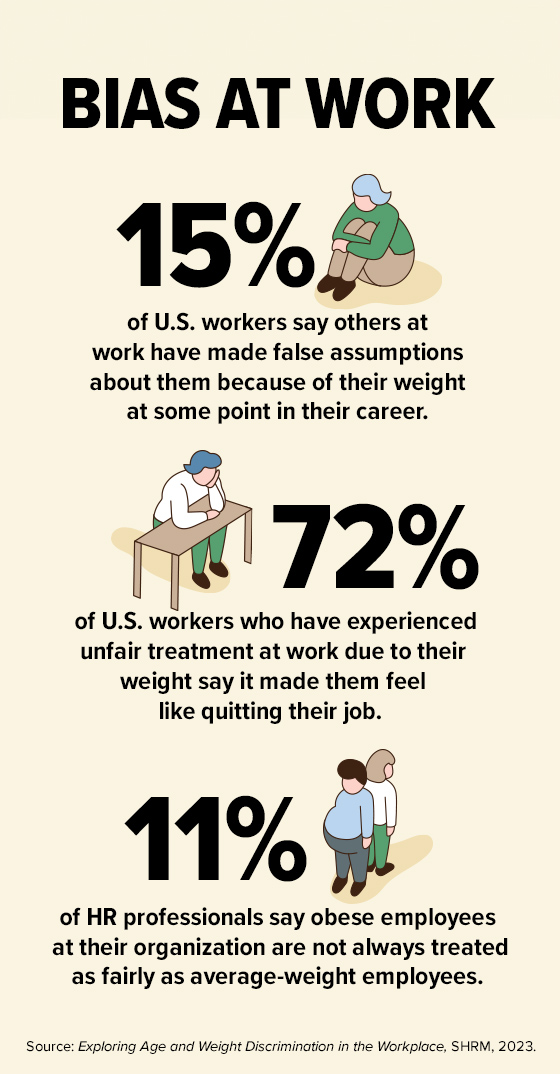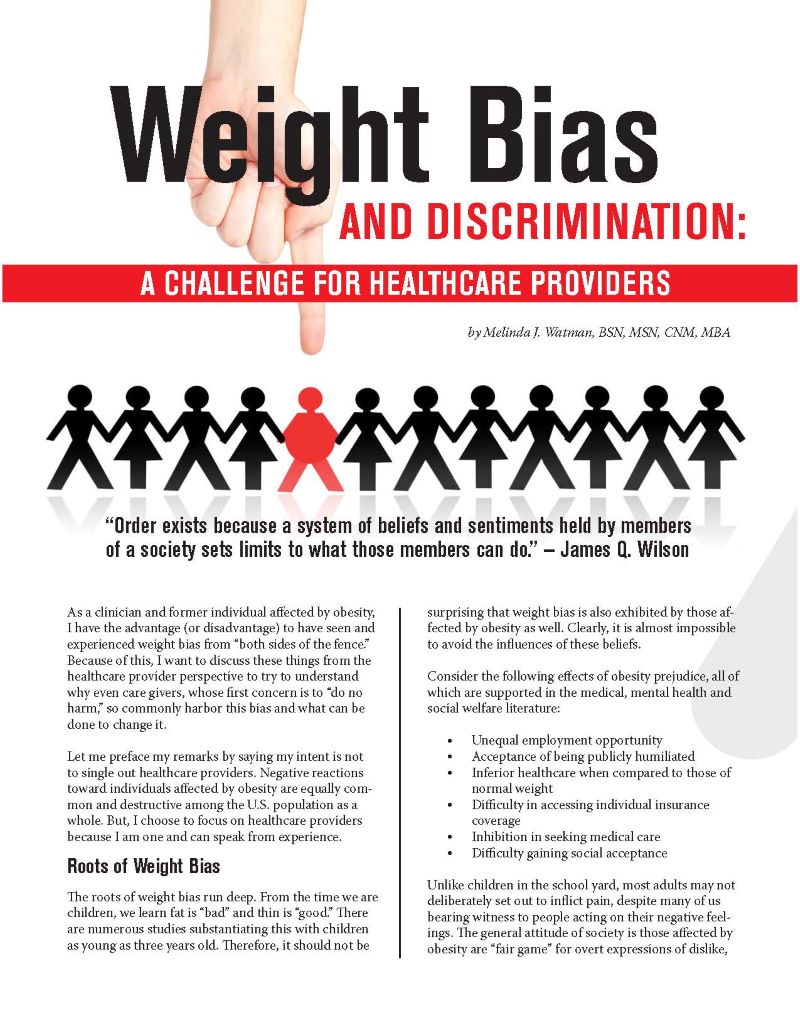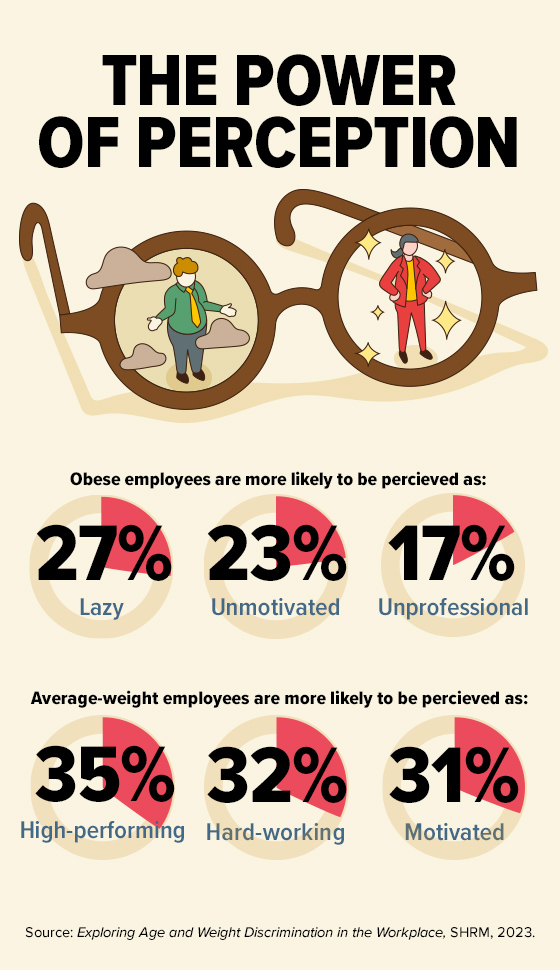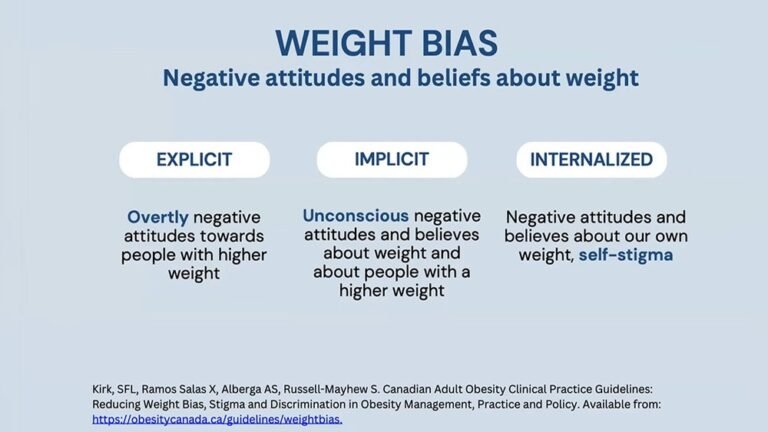Have you ever wondered why people with obesity often face unfair treatment or judgment? This unfairness is called obesity bias, and it affects many areas of life—from healthcare to work and even personal relationships.
If you’ve experienced or witnessed this bias, you know how damaging it can be. Understanding what obesity bias really means is the first step to recognizing it and standing against it. You’ll discover what obesity bias looks like, why it happens, and how it impacts those affected every day.
Keep reading to learn how you can help create a more respectful and fair environment for everyone.

Credit: www.shrm.org
Obesity Bias Defined
Obesity bias refers to unfair attitudes and beliefs about people because of their body weight. This bias often leads to negative judgments and discrimination. It affects many parts of life and can harm both mental and physical health. Understanding obesity bias helps us see how it limits opportunities and affects daily experiences for people with obesity.
Forms Of Weight Bias
Weight bias appears in many ways. It can be open or hidden. Some people might make rude comments or jokes about weight. Others may think someone is lazy or lacks self-control just because of their size. There are also stereotypes that people with obesity are unhealthy or less successful. These ideas are not true but still cause harm.
Weight bias can also show in actions, such as avoiding eye contact or refusing to hire someone. It may affect how people are treated in healthcare or social settings. Bias can be direct or subtle, but both forms hurt self-esteem and wellbeing.
Settings Where Bias Occurs
Obesity bias happens in many places. At work, people with obesity might face unfair hiring or promotion decisions. In schools, children may be bullied or excluded. Health care is another common place for bias. Doctors or nurses might blame all health issues on weight without proper checks.
Media often shows negative images or stereotypes of people with obesity. Even family and friends can show bias by making hurtful comments or treating someone differently. These biases create barriers and make life harder for those affected.
Examples In Healthcare
Obesity bias in healthcare creates many challenges for patients with larger bodies. It affects how doctors, nurses, and staff treat these patients. Bias can show up in words, actions, and even the healthcare system itself. Understanding these examples helps highlight the need for better care and respect.
Negative Comments And Assumptions
Doctors and nurses sometimes make harsh comments about a patient’s weight. They may blame all health issues on obesity without proper tests. This leads to wrong diagnoses and missed treatments. Patients feel judged and less valued during visits. Such assumptions harm trust and can stop patients from seeking care.
Unsolicited Advice And Disrespect
Healthcare providers often give weight loss advice without being asked. They suggest diets or exercise plans without understanding patient needs. This advice feels pushy and ignores other health problems. Some staff stare or make rude remarks behind a patient’s back. These actions show disrespect and lower patient confidence.
Systemic Barriers In Medical Facilities
Many clinics lack proper equipment for larger bodies. Blood pressure cuffs, examination tables, and gowns may not fit well. Waiting room chairs can be too small or uncomfortable. These barriers make visits stressful and embarrassing. The healthcare system needs to improve accessibility and comfort for all patients.
Effects On Patient Care
Obesity bias affects how patients receive care in many serious ways. It can change the quality, timing, and comfort of medical treatment. Patients may feel judged or misunderstood. This creates barriers to good health and trust.
Delayed Or Avoided Treatment
Many patients delay or avoid medical visits due to fear of bias. They expect negative comments or judgment about their weight. This fear stops them from getting timely care. Delays can worsen health problems that need early attention.
Lower Quality Medical Services
Obesity bias can lead to less thorough exams and tests. Doctors may focus only on weight, ignoring other causes of illness. Some patients do not get the right equipment or proper dosages. This lowers the overall quality of care they receive.
Strained Patient-provider Relationships
Bias damages trust between patients and healthcare providers. Patients may feel disrespected or not taken seriously. This weakens communication and cooperation during visits. Strong relationships are vital for effective treatment and patient satisfaction.
Psychological And Health Impacts
Obesity bias has deep psychological and health impacts on individuals. It affects how people see themselves and how others treat them. The bias can cause emotional pain and create barriers to good healthcare. These effects harm both mental well-being and physical health.
Mental Health Challenges
Obesity bias often leads to feelings of shame and low self-esteem. People facing bias may experience anxiety and depression. Negative judgment can increase social isolation and stress. These mental health struggles reduce quality of life. Constant bias makes it harder to seek help and support.
Worsened Physical Outcomes
Weight bias in healthcare can delay proper diagnosis and treatment. Medical providers may wrongly assume all health issues relate to weight. This causes missed or late care for other conditions. Patients may avoid doctors due to fear of judgment. Poor healthcare access leads to worse physical health over time.
Addressing Obesity Bias
Addressing obesity bias is essential for creating fair and respectful healthcare experiences. Bias can harm patients and stop them from getting proper care. Tackling this issue requires efforts in medical training, environments, and communication. These steps help build trust and improve health outcomes.
Improving Medical Training
Medical training must include education about obesity bias. Doctors and nurses should learn how bias affects patient care. Teaching empathy and respect helps healthcare workers treat all patients fairly. Training should also cover how to avoid assumptions about weight and health. This knowledge leads to better diagnosis and treatment plans.
Creating Inclusive Environments
Healthcare settings need to be welcoming for people of all sizes. Clinics and hospitals should have chairs and equipment that fit everyone. Staff should be trained to show respect and avoid judgment. Signs and materials should reflect diversity in body size. An inclusive environment helps patients feel safe and valued.
Promoting Person-first Language
Using person-first language puts the individual before their condition. For example, saying “person with obesity” instead of “obese person.” This approach respects the person’s dignity and reduces stigma. Language shapes how people think and feel about themselves. Health professionals should use words that support kindness and understanding.

Credit: www.obesityaction.org

Credit: www.shrm.org
Conclusion
Obesity bias affects many parts of life. It causes unfair treatment and hurt feelings. People face this bias at work, school, and even healthcare. This bias can stop people from getting the help they need. Understanding obesity bias helps us treat others with kindness.
Everyone deserves respect, no matter their size. By being aware, we can create a more fair and caring world. Small changes in how we think and act make a big difference. Let’s choose empathy over judgment every day.


